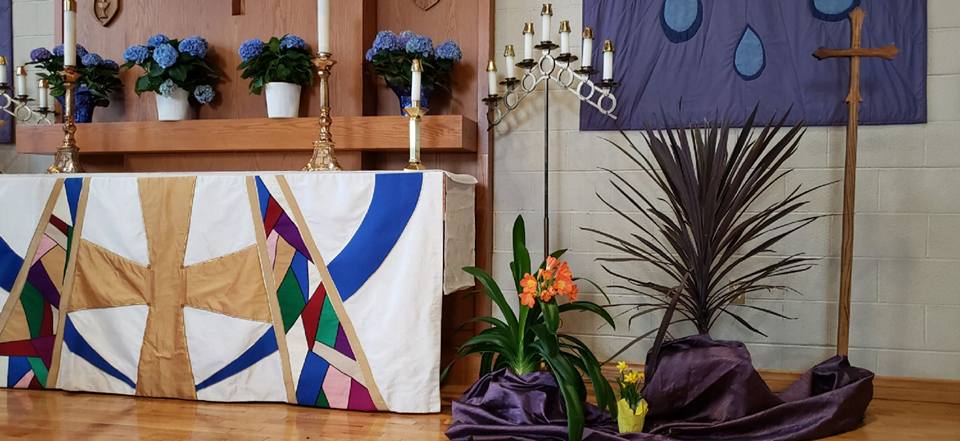Sunday, February 28, 2021:
Genesis 17:1-7, 15-16
Romans 4:13-25
Mark 8:31-38
Here’s what I heard as I sat with our readings this week:
– God said to Abraham: “Walk before me, and be blameless.”
– “No distrust made [Abraham] waver concerning the promise of God, but he grew strong in his faith as he gave glory to God, being fully convinced that God was able to do what he had promised.”
– “If any want to become my followers, let them deny themselves and take up their cross and follow me.”
It’s pretty powerful stuff. And not just “pretty.” It’s powerful, high-expectation, stark stuff. I try to picture the scene we heard today, from Mark’s Gospel. And I imagine Jesus and his companions, continually travelling, and having been accustomed to the sight of Roman crosses lining the road. The sight of crucified enemies of the state and disobedient slaves was a common one; and it wasn’t a pious religious symbol at that time. I’m fully on board with carrying the cross of keeping my little fast and saying my little prayers, but boy, I’m starting to understand Peter’s response to the Transfiguration: ‘let’s stay up here on the mountaintop a little longer.’ Get some distance between us and our crosses. Or his response today: ‘Jesus, stop talking so negatively; you’re scaring the others…’
So what is the good news for us, in today’s world? Those of us who struggle to hear God’s voice and trust in God’s promises? Those of us who waver? Those of us who find everyday life a struggle even without the cross? Not to mention our questions around identity and calling that arise from living in our own isolation bubbles like right now.
Even if we don’t see ourselves as being on the level of Abraham and Sarah, and we might find the cross a disturbing prospect, we can focus on something that Paul writes: “it depends on faith, in order that the promise may rest on grace[.]” This is religious language that basically tries to communicate to us that God comes to us first. No amount of guilt, shame, giving up of chocolate, or even suffering martyrdom will get us right with God — or our own selves — on its own. Yes, Abraham did good in his works, but it was his faith — his trust in God — that shaped him into a faithful follower of God. God called Abraham and Sarah: into a covenant, into a relationship. God called them into receiving an unlikely promise of a 99 year old being an ancestor to many. And Jesus called his disciples — and has called us — into the unlikely promise of full, uninhibited life made present, shockingly, through the ugliness and shame of the cross. And that call to take up our own cross isn’t a test of worthiness. No, he’s saying, I think, something about his desire to form people that reflect and readiate the love of God and the vulnerability of God that Jesus is all about. And how what is needed to comprehend God’s wishes — the surprising promises that God has in store — both for us and for the world, is a wild, creative, imagination. Expect the unexpected.
Easter is going to follow Good Friday.
Be prepared to let go of your assumptions: risk losing your life, and you’ll find that you’ve actually gained it.
So today we have before us the example of Abraham as a model for faith. We need not be discouraged by Paul’s glowing review of him as “unwavering.” In the story we heard his response to God is to fall down on his face. That seems an appropriate, reverent response to the God of the universe sidling up to you. But in a snippet of the story that got edited out of the lectionary is another episode where Abraham falls down on his face before God, but this time he laughs at God’s amazing and unlikely plans. So “unwavering” includes that response, too, I’d say. The key thing here is that God seeks a response, a relationship. Anything but apathy. Jesus, from the cross, cried out “my God, my God, why have you forsaken me?” That is a response, quoting the psalms. And the psalms are full of that honest wrestling.
So even if we don’t feel on par with Abraham, with Paul, or with the disciples; even if we feel like we’re barely getting by, what God wants of us is… us. Our hearts. Abraham agreed to be part of God’s unfolding story. He bowed down in reverence. And he rolled on the floor laughing. He went along for the ride. And today St. Paul reminds us that we’re all being called into God’s story; specifically the story of love stronger than death that we see on the cross. We’re being called into that story, in whatever way we can live into it. And so we listen to it, we’re challenged, encouraged, confused by it, at times… But it’s a story that demands a response. That might help us reorient our intentions and disciplines for Lent, if we have one or more. They’re not tests designed to get us in good with God. They’re practices and virtues that shape us and prepare us to hear again, with imaginations renewed, the Easter story of life over death. But we’re not there yet. The Lenten story continues for a few more weeks, as does our journey. But in the meantime we’re reassured that God is, indeed, calling us, and inviting us along for the ride.
© 2021 The Rev’d Matthew Kieswetter
